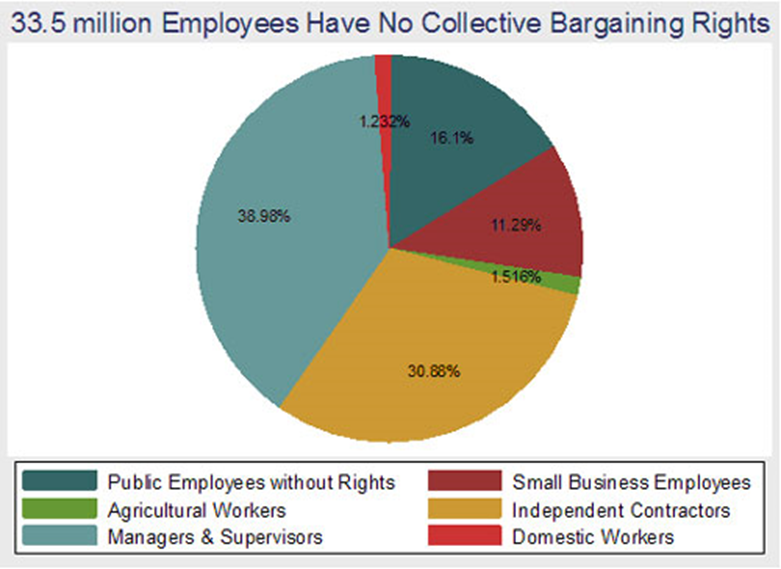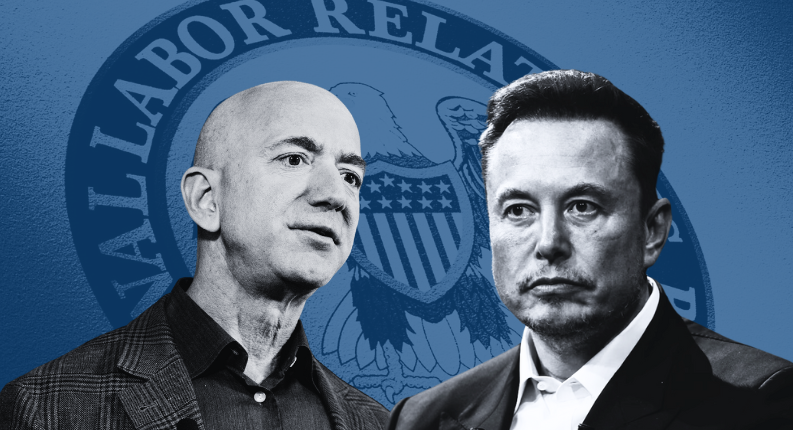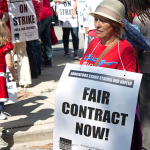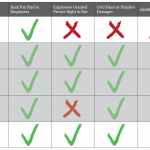How American Labor Law Denies a Quarter of the Workforce Collective Bargaining Rights
Download Executive Summary (PDF) Download Full Report (PDF)
The right to organize and bargain collectively under the protection of law is the bedrock upon which workers are able to form or join a labor union. American labor law has not kept pace with the changing nature and face of the modern workplace and increasingly excludes more and more workers from this legal protection. Increasing numbers of employees have a supervisory aspect or capacity of their work. More and more immigrants join the workforce, especially in the agricultural sector, and more people have been classified as independent contractors, whether by choice or by an employer’s decision. As these changes take place, American labor law denies these workers their legally-protected right to form unions and collectively bargain by either defining workers as not employees or by expressly excluding them.
With the election of a pro-worker president and greater pro-worker majorities in Congress, the political conditions are ripe for addressing the problem of a diminishing population of workers with protected union rights. Congress could clarify or expand the definition of “employee” under the National Labor Relations Act (NLRA) to better reflect the realities of today’s workforce. Several bills have been introduced that would restore collective bargaining rights to employees wrongly categorized as supervisors, independent contractors, and students, and would strengthen the law’s protections of immigrant workers. Additionally, President-elect Obama could appoint members to the National Labor Relations Board and judges to the federal courts to better uphold the NLRA’s mission to promote collective bargaining, and reverse the course of the Bush Administration to narrow the law’s coverage.
This report provides an accurate, up-to-date analysis of the number and type of workers without collective bargaining rights, as well as recent trends in the workforce and legal rulings that have impacted that number. There are 140.5 million people in the civilian workforce. Our research found that of these employees, 33.5 million, or 23.8%, have no rights under the NLRA or any other labor law: no legally-protected right to join or form a union, no legally-protected right to bargain collectively for their wages and conditions of work, and therefore, effectively no freedom of association in the workplace.
The granting of collective bargaining rights differs by sector, industry, and state:
- The NLRA excludes various categories of workers from coverage: supervisors and managers, small business employees, independent contractors, agricultural workers, domestic workers, and most public employees.
- While workers in some of these categories have been granted rights under various state and local statutes, some recent Supreme Court decisions and choices by large employers in effect deprive more and more employees of collective bargaining rights or their meaningful exercise.
- Among public employees, 15.7 million (or 74.5% of all public employees) have been granted rights, whereas 5.4 million (or 25.5%) are without collective bargaining rights.
- Among private sector employees, 101.1 million (or 85%) have collective bargaining rights. By contrast, 17.8 million private employees (15%) have no right to collective bargaining with their employers.
The number of workers who have either no collective bargaining rights, or no meaningful way to exercise these rights continues to grow. The Supreme Court ruling Hoffman Plastics made it more difficult for immigrant workers to receive restitution when their labor rights are violated. Additionally, decisions by the Bush Labor Board have excluded employees with minimal supervisory duties, disabled janitors, graduate student assistants, newspaper carriers, and other categories of workers from the law’s protections. A growing number of employers like FedEx Ground are misclassifying their employees as independent contractors, thus increasing the number of workers who lack basic protection of their rights.
The broken labor law system in the United States denies too many workers the right to collective bargaining, or does not effectively protect them when they try to exercise this internationally recognized human right. The NLRA, passed decades ago, hasn’t kept up with the dramatic changes in the American economy. It’s time for lawmakers to reform this obsolete law to give employers and workers clarity in determining who is eligible to join or form a union. Until the law changes, millions of workers will continue being denied standard workplace protections, and more importantly, the chance to have a union and improve their standard of living.







Why do alot of companies still get away with not having to pay min. Wage? What are the loop holes? I am only making 6.90 an hour and they claim its legal